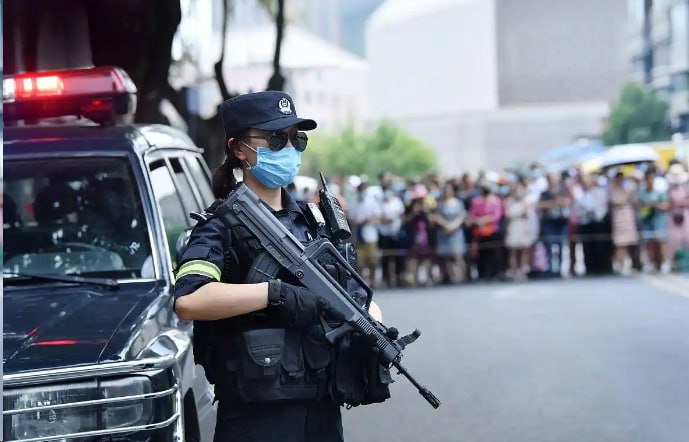

Recently, the Victoria Police in Australia issued a warning that telecommunications fraud targeting Chinese students and new immigrants is becoming increasingly serious, and called on Chinese people not to send money to people claiming to be Chinese public security or government officials.
Police revealed that since the beginning of 2025 , dozens of similar cases have been reported in Victoria, and most of the victims are members of the Chinese community, especially the elderly and international students. For example, a Chinese resident in Melbourne was deceived into transferring 50,000 Australian dollars to " lift the arrest warrant " after receiving a call from someone claiming to be a " Chinese police officer . " Another victim lost more than 100,000 Australian dollars under the intimidation of forged " court documents " sent by the scammer .
Victoria police said that the fraud group initially focused on Chinese students, but recently sent fraudulent messages to all Mandarin speakers, usually defrauding each victim of tens of thousands of Australian dollars. The fraudulent calls came from overseas, and there were people in Australia who acted as collusion. Victoria police have arrested several members of the group, but have been unable to recover the defrauded money.
Police said the scammers contacted the victims via WeChat, sending pre-recorded Mandarin messages to inform them that their packages had been detained and asking them to call back urgently. When the victims responded, the scammers pretended to be couriers or Chinese officials, claiming that their packages contained illegal items and that if they did not want to be deported to China, they had to transfer money to a designated bank account .
The police called on Chinese residents and students not to send money to people claiming to be Chinese police or Chinese officials, and urged victims to report to the police. The police assured that reporting the case would not affect their residence or visa.
Not only Australia, but also Singapore has recently seen a fake police fraud case that sounds even more " unbelievable " . The shocking thing about this case is that the scammers were able to get the victims to accept 24- hour remote monitoring for up to 15 days, and the victims obeyed their orders in extreme fear.
The victim is a female international student named Li from China. One day in November 2024 , she received a call from someone claiming to be an officer of the Singapore Immigration and Checkpoints Authority, saying that she had been reported for fraud in China, which affected her student visa in Singapore.
Afterwards, her call was transferred to the " Shanghai Public Security Bureau " , where a person claiming to be a " police officer " asked her to download Skype to take an online statement. The scammer first showed his police ID in the video, then read out her ID number, her residential address in China and Singapore, and even her parents' and sister's ID information, work units, and bank account details. In the video, she also saw that the place where the scammer was really like a Chinese public security bureau, and there was even a police car parked in the yard.


Such a realistic setting and script made her believe it without a doubt at the time, so much so that she obeyed the other party's request afterwards.
The scammer then transferred the call to another " department " , where the " investigator " explained to her that her bank card was involved in a high-value money laundering record, so she became one of the suspects in this international economic crime. The online case handling process must be kept confidential throughout, otherwise she will face imprisonment.
Afterwards, the " investigators " required her to keep Skype video on for 24 hours , with the camera pointed at herself, and report what she was doing every two hours. They even monitored her when she went to the bathroom or slept. If they caught her playing with her phone, they would ask her to share the screen. They also asked her to uninstall all social apps to prevent her from contacting the outside world.
After 15 days of remote monitoring and brainwashing, the scammers finally began to close the net. They told her that because the victim of a money laundering case had jumped off a building, she had to prepare 1 million RMB without telling her parents and return to China to hand the cash to a " plainclothes policeman " outside a bank in Guangdong , not at the bank counter, otherwise she would be detained.
During this period, the scammer even asked a " plainclothes policeman enforcing the law in Singapore " to come downstairs of her residence. The middle-aged man brought a " confidentiality agreement " and some documents for her to sign.
Fortunately, she became suspicious at a critical moment and found a place with blind spots for surveillance and used another laptop to search for information about such fraud cases online, and then she suddenly realized the truth. At this time, she had already prepared 1 million in cash. She immediately went to the Singapore police station to report the case, but since there was no actual loss of property, no case was filed. However, she still felt that her experience was very warning, so she made it public to the Singapore media, hoping to warn the majority of compatriots.
Regarding the recent frequent cases of this kind, the Chinese Embassy in Singapore also issued a statement in a timely manner, 'saying': Recently, it has received reports of several Chinese students being defrauded by " fake officials " in telecommunications fraud. The fraudsters not only defrauded the students of their tuition and living expenses, induced the students to deceive their parents into sending money, but also induced the students to pay the so-called " security deposit " through " online loans " . There have even been cases where " fake officials " came to the door with " arrest warrants " and handcuffs to " arrest " .
The embassy stressed that the Chinese and Singaporean government departments will not ask for personal information over the phone for any reason, and it is even more impossible to directly transfer the " online case handling " of the public security, procuratorial and judicial departments in China .
This case is indeed very representative. The scammers can basically make the script and props look real. As overseas Chinese, the first reaction when encountering such a thing is of course fear. Once people fall into fear, their ability to discern and think independently will also decline rapidly.
This case is indeed very representative. The scammers can basically make the script and props look real. As overseas Chinese, the first reaction when encountering such a thing is of course fear. Once people fall into fear, their ability to discern and think independently will also decline rapidly.
